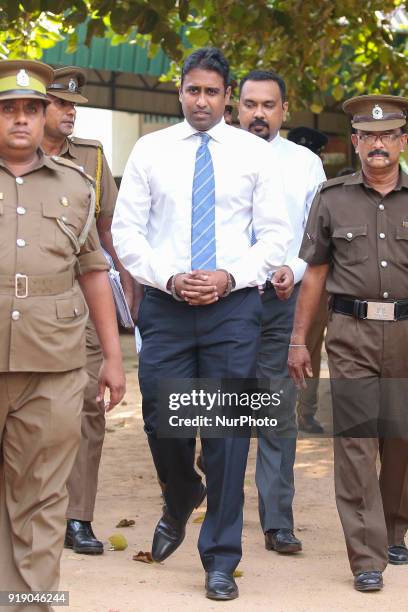-By LeN Economic Correspondent

(Lanka-e-News -01.July.2025, 8.20 PM) The Sri Lankan Department of Inland Revenue has launched fresh legal proceedings against the embattled directors of Mendis Company, alleging a colossal tax evasion scheme exceeding Rs. 1 billion in unpaid Value Added Tax (VAT). The case, filed before Colombo Additional Magistrate Pavithra Sanjeewani Pathirana, marks the latest chapter in a saga that has previously seen the firm’s top executives convicted and jailed.
According to the complaint, Mendis Company failed to remit VAT dues amounting to Rs. 1,035,473,988 — over 1.03 billion rupees — during the financial years 2019 and 2020. The charges have been filed specifically against Arjun Aloysius and Anthony Randhev Jineendra John, both directors of the company and no strangers to Sri Lanka’s legal spotlight.
At a hearing held on June 30, the Magistrate issued summons requiring the accused to appear in court on October 13, following a motion submitted by state counsel Dinesh Perera on behalf of the Commissioner General of Inland Revenue.
The latest indictment underscores the Inland Revenue Department’s renewed efforts to clamp down on high-profile corporate tax fraud in the wake of growing public outcry over unequal accountability in financial crimes.
This is not the first time Mendis Company — one of Sri Lanka’s most well-known alcohol manufacturers — has been in the dock for tax irregularities. In an earlier case, also brought by the Inland Revenue Department, the same directors were convicted of VAT fraud and handed six-month prison sentences. While the initial conviction was hailed as a rare instance of corporate accountability, critics have long argued that regulatory enforcement remains sporadic and politically selective.
“Tax justice cannot be episodic,” said a senior official from the Department, speaking on condition of anonymity. “When corporations repeatedly flout VAT regulations, it’s not just the Treasury that suffers — it’s every citizen.”
The alleged VAT default took place in the aftermath of the 2019 Easter Sunday attacks and during the early months of the COVID-19 pandemic, a period marked by national economic distress and collapsing government revenues. Prosecutors argue that while the rest of the country struggled, Mendis Company deliberately withheld massive VAT payments, depriving the state of critical fiscal resources.
Arjun Aloysius, one of the accused, is best known as the central figure in the infamous 2015 Central Bank bond scandal, which rocked the country’s financial system and triggered a major political upheaval. Despite multiple investigations and a Presidential Commission of Inquiry, Aloysius has continued to operate in the business sector, drawing the ire of anti-corruption campaigners.
His co-accused, Anthony Jineendra John, has kept a lower public profile but remains deeply involved in the financial operations of the Mendis Group. Both men are now expected to defend themselves against what Inland Revenue officials describe as “clear and systematic evasion of VAT obligations.”
The prosecution’s case rests on documented failures by Mendis Company to file proper VAT returns and settle outstanding dues over a two-year period. Legal analysts suggest the government is determined to make an example of the company in its bid to recover lost tax revenue and improve compliance across the corporate sector.
The case comes amid a broader push by the Inland Revenue Department to bolster its enforcement powers and address Sri Lanka’s chronic tax collection shortfalls. According to the Central Bank’s 2024 annual report, Sri Lanka continues to lag behind regional peers in tax-to-GDP ratio — a figure heavily skewed by corporate tax avoidance and underreporting.
“This case sends a signal,” said taxation expert and former Inland Revenue Commissioner, Sarath Weerasekara. “The days of cosy arrangements and under-the-table settlements must end. If large firms do not comply, it sets a dangerous precedent for smaller enterprises who see taxes as optional rather than obligatory.”
Weerasekara also warned, however, that enforcement must be even-handed. “It’s not enough to go after headline names. The state must pursue all defaulters — big and small — if it wants credibility in revenue collection.”
Observers note that the re-filing of charges against Mendis also arrives at a politically charged moment. With parliamentary elections expected in early 2026 and the government under pressure to increase state revenue without raising taxes, visible crackdowns on high-profile business figures are politically expedient.
“Tax enforcement has become a political theatre,” said a senior political analyst. “While action is necessary, the risk is that cases are filed to make headlines rather than secure convictions.”
Meanwhile, sources close to Mendis Company have privately suggested the firm intends to contest the charges vigorously. A legal representative for Aloysius, speaking off-record, dismissed the latest summons as “a continuation of politically motivated harassment.”
Yet public sentiment remains firmly unsympathetic. Online reactions to the news have been swift, with many Sri Lankans expressing frustration at the apparent impunity with which corporate elites operate.
The Colombo Magistrate’s Court will now play host to a fresh legal showdown between the state and one of the country’s most controversial business entities. If successful, the case could help recoup more than Rs. 1 billion in lost taxes — a sum that would be a small but symbolic victory in Sri Lanka’s battle against fiscal indiscipline.
For now, the focus will be on October 13, when Aloysius and John are expected to appear in court. Should they fail to do so, arrest warrants may follow — though few expect such a spectacle in a country where elite accountability remains elusive.
The Rs. 1 billion VAT case against Mendis Company is more than a financial dispute. It is a test of Sri Lanka’s commitment to tax justice, corporate transparency, and the rule of law. Whether this case marks a genuine shift in enforcement or becomes yet another footnote in the country’s chequered legal history remains to be seen.
But one thing is clear: for a country in economic distress, the cost of corporate impunity is becoming too high to bear.
-By LeN Economic Correspondent
---------------------------
by (2025-07-01 14:50:20)
Leave a Reply